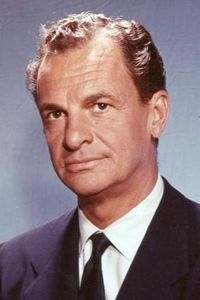James Gregory, a distinguished thespian, made his grand entrance into the world on December 23, 1911, in the esteemed borough of the Bronx, New York, and spent his impressionable early years residing in the charming town of New Rochelle, New York.
Following the devastating 1929 stock market crash, Gregory embarked on a new professional journey, trading in the fast-paced world of finance for the exhilarating realm of performing arts. Initially, he found himself working as a runner on Wall Street, a role that, although challenging, ultimately proved to be a mere stepping stone towards his true calling. As his passion for the stage continued to grow, Gregory made the bold decision to transition into summer stock theater, a bold move that would ultimately lead to his professional debut in 1935. Over the years, he would go on to perform in a wide range of productions, captivating audiences across the tri-state area, including the bustling metropolises of New York, the charming towns of New Jersey, and the historic cities of Maryland.
Gregory's ensemble of talented individuals embarked on a grueling tour of rural communities in Pennsylvania and West Virginia, presenting their artistic endeavors in a variety of settings, including school auditoriums, places of worship, and Young Men's Christian Association (YMCAs) facilities. Despite the modest compensation of twenty-five dollars per week, Gregory's troupe persevered, driven by their passion for performance.
Years later, in 1939, Gregory's hard work and dedication finally paid off as he made his Broadway debut in the critically acclaimed production of "Key Largo."
Gregory's illustrious theatrical career spanned an impressive 16-year period, during which he took to the Broadway stage a total of approximately 25 times, garnering widespread acclaim from the esteemed drama critics of the day.
Gregory's personal life took a significant turn in 1944, as he exchanged vows with Anne, a union that would endure for the remainder of his life, ultimately coming to a close with his passing.
Following the conclusion of World War II, Gregory's professional trajectory continued to soar, as he remained committed to his work on Broadway, garnering widespread critical acclaim from esteemed publications such as the New York Press, Boston Globe, New York Times, Chicago Tribune, Hollywood Reporter, and Variety.
Gregory's initial foray into the realm of television commenced in the year 1951, marking the beginning of his foray into the world of small screen entertainment. His transition from the stage to the world of live television took place in 1955, a pivotal moment in his career that would set the stage for his future success.
Gregory Hines, a pioneering television personality, made a groundbreaking contribution to the small screen in 1959 by co-starring in the inaugural episode of the esteemed science fiction anthology series "The Twilight Zone", a milestone that successfully pitched the program to a wider audience. Subsequently, he went on to participate in a diverse array of cinematic and television productions, such as the Matt Helm film franchise and the cult classic television series "Barney Miller", where he portrayed the iconic character of Inspector Frank Luger from 1974 to 1982.
Gregory, in the iconic role of Inspector Luger, imbued the character with a charming, yet exasperating, and humorously endearing quality, thereby garnering widespread critical acclaim and solidifying his position as a cherished and revered thespian.
Following his departure from the acting world in 1983, Gregory left behind a remarkable body of work, comprising more than one hundred television and film credits, which collectively captivated a global audience and endeared him to fans worldwide, forever cementing his legacy as a beloved and respected figure in the entertainment industry.
The esteemed Gregory, when posed the question of encapsulating his life's comprehensive and multifaceted journey, responded with characteristic modesty, simply stating, "I am an actor." Yet, his devoted followers, well-versed in his remarkable accomplishments, would vehemently dispute this self-effacing assessment, instead perceiving him as a paragon of virtue, a beacon of inspiration, and an indelible symbol of excellence within the realm of the entertainment industry.





























































































